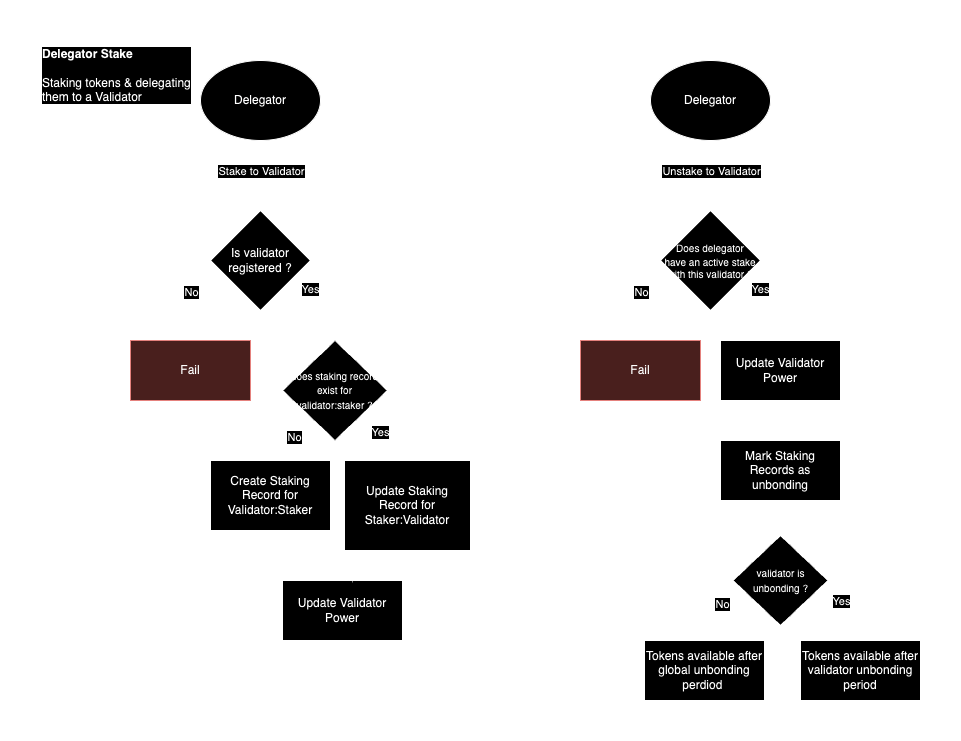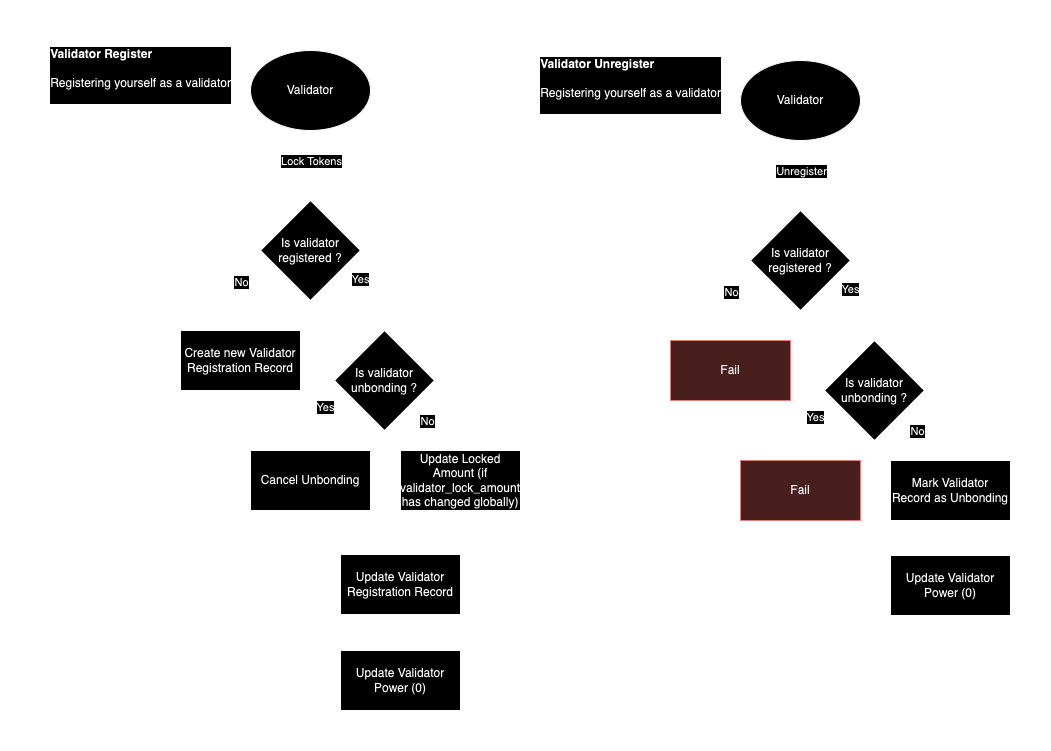WARNING
🚧 Under Construction - This page is in draft status
Staking
Xian tokens can be used to engage in governance in two ways :
- Become a validator.
- Delegate Xian tokens to an existing validator.
Becoming a validator
- Validators provide a vital purpose on the Xian network by creating & validating blocks.
- Set up the proper hardware, following our setup guide (LINK)
- Notify the community on the Forums (LINK) or Telegram about your intention to become a validator, let them know about your core values and principles, asking people to delegate their stake to you.
Become a delegator
- Delegators add to the decentralisation of the network by allowing any user to stake their tokens & assign the voting power of those tokens to a validator.
- To delegate tokens, use the xian-wallet (LINK)
Incentives
Both validators & delegators earn rewards in two ways :
- A variable % of their locked tokens back as a reward for participating in network governance.
- Transaction fees from each block are split proportionally between all validators & delegators, once other fees are allocated (black_hole, foundation)
- Validators may charge a commission %, which will be subtracted from the transaction fees before being split with delegators
Variable reward
The reward % on tokens staked varies as the network attempts to incentivise an optimal % of circulating tokens to be locked in governance.
Validator Votes
The following values can be changed via governance votes :
staked_target- the optimal # of tokens staked by delegators / validatorsreward_target- the reward per annum awarded to staked tokens when the amount staked is atstaked_targetstaking_epoch_length- how often a new staking epoch is created.reward_min- the minimum reward that can be awarded to stakers, as thetotal_stakedexceedsstaked_targetreward_max- the maximum reward that can be awarded to stakers, astotal_stakedfalls belowstaked_targetreward_steepness- the rate of change of the reward amount.validators_max- the maximum amount of validators involved in producing blocks.validator_lock_amt- the amount a validator must lock to become a validator.
Staking Epochs
- Staking epochs exist as a snapshot of all validators & delegators stakes in a given time period.
- a snapshot of validator power & individual validator commission % (which can be changed by a validator)
- At the end of the
staking-epoch, all rewards accumulated are available to be claimed by the owners of tokens staked at the beginning of that epoch.- A record is added to the
staking-epochdetailing how many tokens are to be minted & how much many fees were accumulated.
- A record is added to the
- At the beginning of a new
staking-epoch, a record is created of the global amt staked & the owners of those tokens. - New tokens locked by validators / delegators will not be recognised & eligble to participate in governance & receive rewards until the beginning of the following
staking-epoch
python
# StakingEpoch
# Values in the StakingEpoch are snapshots of relevant state from the parent & other contracts (where the states live & their format is TBA)
{
staked_active: 3000000 # float // the amount staked in the active validator set at the beginning of the epoch
total_staked: 40000000 # float // the smount staked in the entire validator set (inactive + active)
staked_target: 6000000 # float // the amount of xian tokens in circulation at beginning of the epoch
start: # time
end: # time // start + staking_epoch_length
reward_target: 0.1 # float // 10%
reward_min: 0.05 # float // 5%
reward_max: 0.2 # float // 20%
reward_steepness: 0.01 # float
validators_max: 30 # int
validators : { # the validators in the active validator set & their staked
<validator_account>: {
v_power: 10000 # the power of the validator locked tokens
d_power: 800000 # the power of the tokens delegated to this validator
commission: 0.1 # the commission fee the validator takes on fees.
unbonding: False # This can be a Date or False
}
}
}Issues : - Should Staking Epoch be a Hash or a dict ?
python
# Combined function to target rewards % :
import math
def sigmoid(x, target, k=1):
return 1 / (1 + math.exp(-k * (x - target)))
def inverse_sigmoid(x, target, k=1):
return 1 - sigmoid(x, target, k)
def combined_reward(x, target, k=1, reward_min=0.05, reward_max=0.20, reward_target=0.10):
if x < target:
sigmoid_value = sigmoid(x, target, k)
return reward_target + (reward_max - reward_target) * (1 - sigmoid_value)
elif x == target:
return reward_target
else:
inverse_sigmoid_value = inverse_sigmoid(x, target, k)
return reward_target - (reward_target - reward_min) * (1 - inverse_sigmoid_value)
# Example usage
staked_target = 1000
reward_steepness = 0.01 # Adjust this value to control the reward_steepness
reward_min = 0.05
reward_max = 0.20
reward_target = 0.10
# Test cases
staked_amounts = [800, 1000, 1200, 1500, 2000]
for amount in staked_amounts:
reward_percentage = combined_reward(amount, staked_target, reward_steepness, reward_min, reward_max, reward_target)
print(f"Staked Amount: {amount}, Reward Percentage: {reward_percentage * 100:.2f}%")
"""
### Output
Staked Amount: 800, Reward Percentage: 18.19%
Staked Amount: 1000, Reward Percentage: 10.00%
Staked Amount: 1200, Reward Percentage: 9.88%
Staked Amount: 1500, Reward Percentage: 8.18%
Staked Amount: 2000, Reward Percentage: 5.12%
"""Staking Tokens
Aspiring validators must lock tokens to register as a validator.
- This will immediately allow the validator to join the validator set, provided they have enough staked or tokens delegated to them to join the quorum
- Rewards will not begin accruing until the next
staking_epoch
Delegators can delegate tokens to a validator by locking them and selecting a validator
- The validator will immediately gain the voting power of those tokens
- Rewards will not begin accruing until the beginning of the next
staking_epoch
Only validators in the active validator set & their delegators can receive rewards.
Unstaking tokens
- Validators and delegators may choose to unstake their tokens at any point
- Voting weight from these tokens is immediately removed from the validator
- Validators who un-stake their tokens are immediately removed from the quorum
- Un-staked tokens will no longer receive rewards after the end of the current StakingEpoch
- Both validators and delegators who un-stake their token must wait until the validator
unbonding_periodhas passed before regaining access to their tokens - All rewards must be calculated and credited to the account before performing this action.


The following values can be changed via governance votes :
unbonding_period- the time a staker must wait after un-staking before regaining access to their tokensvalidators_max- the maximum amount of validators in the active validator set
Staking Contract State
python
StakingEpochs = Hash() # dict
CurrentEpoch = Hash(default_value=0) # The index tracking the current epoch : int
Delegators = Hash() # Delegations:<validator_account>:<delegator_account> : float
Validators = Hash() # Validators:<validator_account> : dict
"""
{
amount: float,
unbonding: Date or False,
v_power: float,
d_power: float,
commission: float,
epoch_joined: int # The index of current_epoch + 1
epoch_collected: int or None # The index of the last epoch which rewards were collected for.
}
"""
Delegators = Hash() # Delegators:<delegator_account>:<validator_account>
"""
{
amount: float,
unbonding: Date or False,
epoch_joined: int # The index of current_epoch + 1
epoch_collected: int or None # The index of the last epoch which rewards were collected for.
}Receiving Rewards
- Delegators & Validators may make a transaction to receive their rewards up to the last finalised
staking-epoch. - Each
staking-epochthe actor was present for must be iterated over, the rewards due calculated & added to the actor's account. epoch_collectedis updated the the last completedstaking_epoch
Issues :
- How do we make sure that delegators only receive rewards for
staking_epochswhere their validator was active ? - We must make sure that the correct fee % is allocated to validators for each period.
- Fees & rewards must only be allocated for epochs where the validator was present in the active validator set.
- The amount of
staking_epochsiterated over may be in the thousands, we must ensure that contracting can handle this. - What's the most efficient way to do this ?
Restaking / Changing Delegations to different validators
- Do we want to support this ? / How can this work ?
When claiming the system must understand :
- If the validator was present in the `active_validator_set` for each StakingEpoch
- The validator commission for each StakingEpoch
- The amount staked by the claimant for each Epoch